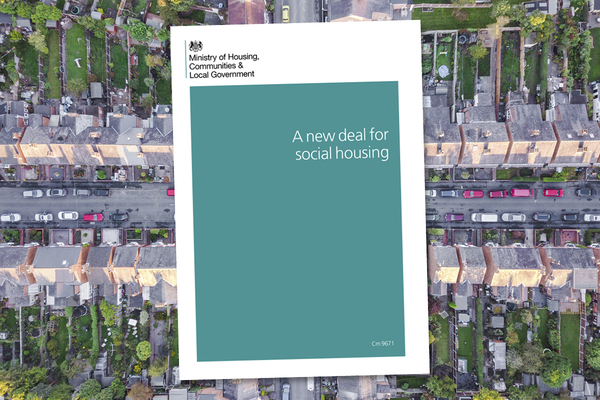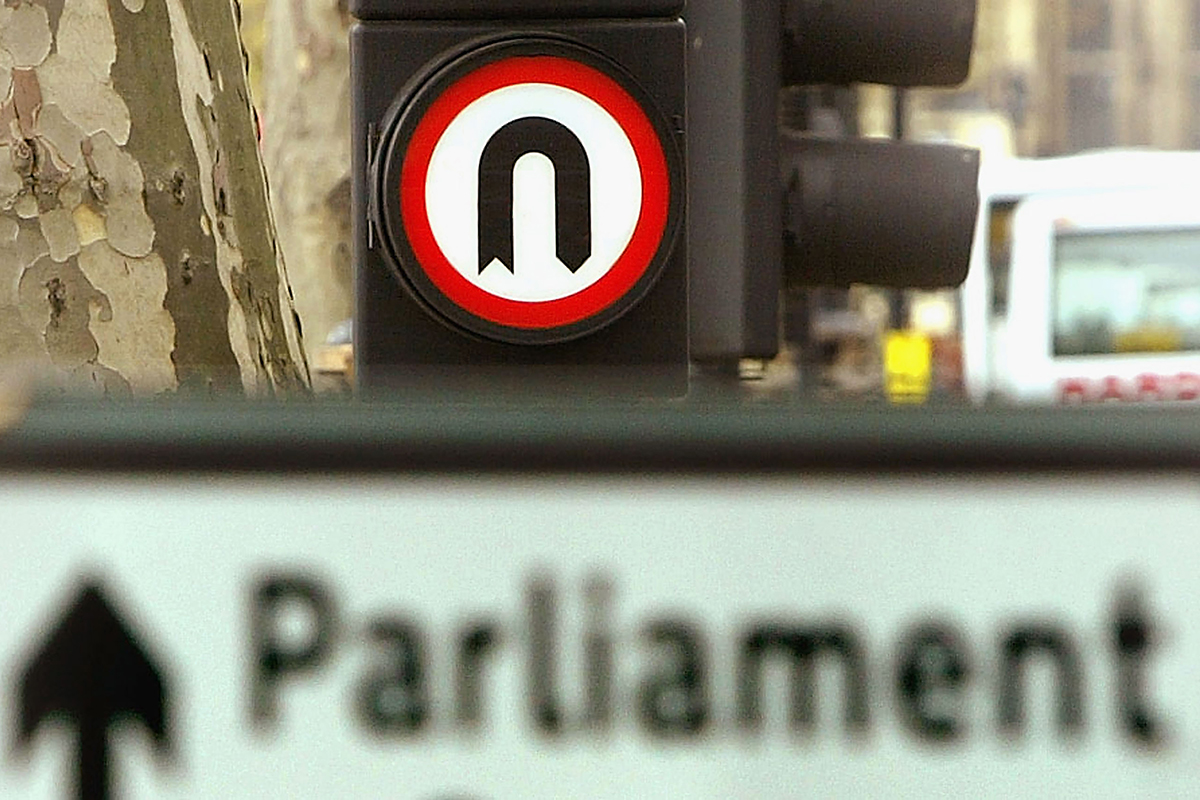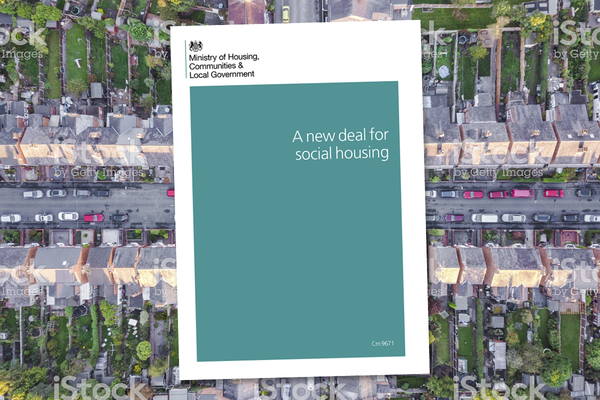Green paper marks a ‘milestone’ on resident involvement
The government’s recognition residents need clear information is to be welcomed. Now it’s up to the sector to embrace tenant involvement, writes Paul Hackett
The government’s release of the Social Housing Green Paper marks an important milestone.
It kicks off the next stage of the national debate about social housing and includes a diverse range of proposals we’ll all want to debate.
As expected, resident involvement is a key theme. I really welcome that focus.
The housing association sector is different from most others.
Our residents aren’t conventional consumers in that they lack the power to straightforwardly vote with their feet and take their custom elsewhere.
Likewise, when landlords push services residents don’t value, those landlords don’t suffer a loss of revenue.
“Our residents aren’t conventional consumers in that they lack the power to straightforwardly vote with their feet and take their custom elsewhere.”
In other sectors you’d find out immediately through the cash register. Without these ‘market signals’ there is a much greater onus on landlords to listen to residents and act on their feedback.
However, relying on data alone doesn’t cut it.
A combination of quantitative and qualitative methods is needed, with residents helping make sense of what the data is telling us and working in partnership with landlords to drive up service quality.
We welcome the government’s recognition residents need clear and transparent information about how their landlord’s performance compares with others as it will feed into this process of scrutiny-led improvement.
My hope is that on resident involvement, the green paper won’t just spark debate between the government and the sector.
We need a stronger debate within the housing sector and within our own organisations on how we can work in genuine partnership with our residents.
That’s because we’re not starting from scratch – there is excellent resident involvement going on right now, all over the country, in associations of all types and sizes.
Examples we can all learn from, lessons we can all share, experience we can all draw on.
As a housing movement, we need to show we embrace resident involvement. This will help build trust with our residents and, I would argue, also drive up the quality and efficiency of our services.
None of us have a monopoly on wisdom, but as Optivo has been on a long journey of improving our resident involvement, I thought it might be useful to share some of what we’ve learned along the way.
For me, resident involvement isn’t an add-on, nor an optional extra – it’s been central to our efforts to turn the organisation around. I joined Amicus Horizon in 2009 as it was emerging from regulatory supervision.
Residents were frustrated at poor service, felt excluded from decision-making and didn’t trust their landlord to deliver. It became clear we couldn’t improve performance without winning back resident trust, nor without building their insights of what wasn’t working into the plan.
It’s been a long journey, but my experience has been that resident involvement has brought major benefits – culturally, operationally and financially. We could not have improved our services to the extent we have without the knowledge, expertise and passion of our residents.
“Resident involvement has brought major benefits – culturally, operationally and financially.”
Residents were keen for change and had clear ideas about what needed sorting out, so working in genuine partnership drove improvement faster and more effectively.
Our significant investment of staff time and financial resources in resident involvement has been far outweighed by the savings it’s generated.
A University of Westminster study in 2015 found we’ve secured an annual saving of £2.7m “attributable in large part to resident involvement” in procurement and challenging contractor performance. Too often in organisations, time is spent second-guessing what residents value. My view is ask them, involve them and co-design improvements with them.
Our involvement work has been critical to our success in driving up resident satisfaction. This is not without its challenges. It means difficult conversations, it means staff who are comfortable being challenged, but it also means we get more things right first time.
“Genuine resident involvement is fundamentally about changing organisational culture, not just structures.”
This is not to say increasing resident involvement is easy, nor straightforward. In fact, I’d argue it’s often misunderstood.
I’d offer four main reflections from our ongoing resident involvement journey. The first is genuine resident involvement is fundamentally about changing organisational culture, not just structures.
It can be easy to set up panels and committees – we’ve got those in abundance – but if staff don’t believe it’s genuinely valuable, it will never work.
The board and senior team need to embed a culture where staff see resident involvement is valued.
Paul Hackett, chief executive, Optivo, and chair, G15 group of associations in London
What the Green Paper says about tenant involvement and performance data
"We want residents to be able to compare performance more easily.
"We want landlords to be assessed against standards that matter to residents. To achieve this, performance data needs to be published in a clear, regular and consistent format. We consider that the most effective way of doing this is for the performance of all landlords to be assessed against a number of agreed and meaningful key performance indicators which will be made publically available in a way that enables easy comparison.
"We think that any key performance indicators should be focused on issues of key importance to
residents, covering those identified through our engagement, such as:
• keeping properties in good repair;
• maintaining the safety of buildings;
• effective handling of complaints;
• respectful and helpful engagement with residents;
• responsible neighbourhood management, including tackling anti-social behaviour"
The second is that to secure the maximum benefits from resident involvement it needs to be embedded throughout the organisation.
We have residents scrutinising repair performance, involved in making procurement decisions, helping shape new policies, chairing complaints panels and sitting on our board – wherever decisions are being made, you’ll find our residents.
The third is that real co-creation means a one-size-fits-all approach can never work. Engagement has to be based on what works for the residents involved - imposing resident engagement from above or introducing identikit structures won’t produce the desired results.
We’ve learnt to be flexible and are happy to agree any reasonable approach that works for both residents and the organisation.
My final lesson has been that resident involvement never stops evolving, nor should it.
Our residents increasingly run their lives through their smartphone and we risk not keeping up. Residents are helping to shape a housing avatar and we’re exploring how they might want to be involved in decision-making through their phones. Following the Hackitt Review, our Resident Scrutiny Panel is spending the summer meeting residents in high-rise blocks to explore how they’d like to be involved in fire-safety decision-making.
As our residents lives evolve, so must we.
Let’s drive this agenda, let’s offer up lessons and new thinking, let’s pull together as a housing movement to show residents are at the heart of what we do.
Paul Hackett, chief executive, Optivo
Social Housing Green Paper: full coverage
All our Social Housing Green Paper coverage in one place:
Green paper measures are not enough to create May’s ‘new generation’ of council homes Green paper proposals are welcome but much more is needed to support councils to build, writes John Bibby
Green paper shows ministers now see associations as trusted partners Focusing on the failure of the green paper to address supply misses the point, writes Boris Worrall
Government should focus on building on what is already strong Philippa Jones considers the Social Housing Green Paper through a slightly different lens
We need more than a week of delayed announcements bundled together Jules Birch reflects on the government’s ‘Housing Week’ announcements
The regulator should monitor how associations assist homeless people Government announcements this week are positive, but any enhanced role for the English regulator should include looking at homelessness prevention work, argues David Bogle
The regulator’s role should be limited to dealing with systemic failures Julian Ashby suggests the Housing Ombudsman Service should deal with all complaints
The green paper shows ministers are in listening mode Despite some glaring omissions, the government appears to be in listening mode and it is important the sector takes advantage, argues Emma Maier
A short history of social housing league tables Attempts to create league tables for housing associations are nothing new. Mervyn Jones looks at how they have worked in the past
League tables could prove blunt and counter-productive, sector warns Housing figures criticise government proposals to measure social landlords against performance indicators
Government ‘must decide how proactive regulator should be’ on consumer standards Ministers now face a dilemma over the regulator’s focus, sector figures say
The Green Paper: a golden opportunity missed? Melanie Rees assesses the Social Housing Green Paper against recommendations drawn up by the Chartered Institute of Housing and finds the government comes up short
Longer strategic partnerships and guranteed debt to boost social housebuilding The Social Housing Green Paper outlines key ways of boosting supply
The green paper is remarkable progress but it is still not enough The green paper suggests the government appears to be re-writing much of its policy since 2010, but more needs to be done, writes Jules Birch
Green paper marks a ‘milestone’ on resident involvement The government’s recognition residents need clear information is to be welcomed, now it up to the sector to embrace tenant involvement, writes Paul Hackett
Ministers consider stock transfer programme to community-led associations The stock transfer programme could be revived under proposals in the housing green paper
Access to housing grant could be tied to new league tables Grant could be awarded according to how well landlords meet performance indicators, the paper suggests
Ofsted-style regulation of tenant services proposed The government is considering expanding the Regulator for Social Housing’s remit to intervene over tenant services and give it a more “proactive approach to enforcement”
Government proposes dropping one-for-one Right to Buy replacement commitment A consultation paper published alongside the green paper proposes a broader measurement to replace the one-for-one pledge
A list of recent housing policy U-turns The green paper confirms yet more housing policy U-turns from the government, which has spent the past two years dropping policy ideas developed under the David Cameron government. Here is a rundown of the major changes in policy direction
Sector welcomes green paper but calls for more ‘ambitious investment’ Reaction to the proposals, from the National Housing Federation, Chartered Institute of Housing and more
Morning Briefing: reaction to green paper announcements how the media reported the proposals trailed by the government overnight
Government drops plans to force councils to sell higher-value stock The government drops plans to force councils to sell higher value homes
League tables and ‘sharper teeth’ for regulator in social housing green paper Ministers reveal some of the things in the paper ahead of its publication
Grenfell survivors: green paper does not go far enough survivors of the Grenfell Tower fire have said the measures published in the Social Housing Green Paper do not do enough to rectify issues in the social housing sector
KEY PROPOSALS IN THE SOCIAL HOUSING GREEN PAPER
- New 'league tables' of housing providers based on key performance indicators, surrounding services such as repairs and neighbourhood management. This could be linked to housing grant.
- Consideration to scrapping of the current 'serious detriment' test, to allow 'Ofsted-style' tougher consumer regulation
- New home ownership options such as allowing tenants to buy as little as 1% of their property each year through shared ownership. This would only apply to new shared ownership purchases.
- Ditching of plans to force social landlords to offer fixed term tenancies rather than lifetime tenancies in social housing
- Ditching of plans to force councils to sell off their most valuable social housing when it becomes vacant
- The potential introduction a new stock transfer programme from councils to 'community-led' housing associations
- The return of guaranteed debt funding to help the development of affordable homes, and longer term 'strategic partnerships' for developing housing associations














